|
|
|
Sort Order |
|
|
|
Items / Page
|
|
|
|
|
|
|
| Srl | Item |
| 1 |
ID:
128045


|
|
|
|
|
| Publication |
2014.
|
| Summary/Abstract |
The 2009 Renewable Energies Directive (RED) has set up ambitious targets concerning biofuel consumption in the European Union by 2020. Nevertheless, budgetary constraints and growing concerns about the environmental integrity of first-generation biofuels have imposed a phasing out of the fiscal instruments to promote them. Focusing on France, this paper combines an exogenous increase in oil prices and tax policies on fossil fuels. The objective is to determine the efficiency of an alternative incentive scheme for biodiesel consumption based on a higher price of the fossil fuel substitute. Policy simulations are implemented through a dynamic computable general equilibrium (CGE) model calibrated on 2009 French data. The results show that the 10% biodiesel mandate set by the RED would not be achieved even if the fixed taxes on diesel reach the same level as those on gasoline. Although integrating the rise in oil prices into the fiscal framework improves the biodiesel penetration rate, it remains below the target. Moreover, we find that the effects of biofuel consumption are limited to the biofuel chain sectors. In other agricultural sectors, the substitution effect of biodiesel with diesel is partially offset by the pricing effect induced by higher energy production costs.
|
|
|
|
|
|
|
|
|
|
|
|
|
|
|
|
| 2 |
ID:
130412
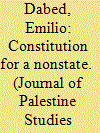

|
|
|
|
|
| Publication |
2014.
|
| Summary/Abstract |
This article sheds new light on the political history of legal-constitutional developments in Palestine in the fourteen years following the Oslo Accord. It examines the relationship between the unfolding social, political, and economic context in which they arose, on the one hand, and PA law-making and legal praxis, on the other. Focusing on the evolution of the Palestinian Basic Law and constitutional regime, the author argues that the "Palestinian constitutional process" was a major "battlefield" for the actors of the Palestinian-Israeli conflict. Thus, changes in the actors' political strategies at various junctures were mirrored in legal-constitutional forms, specifically in the political structure of the PA. In that sense, the constitutional order can be understood as a sort of "metaphoric representation" of Palestinian politics, reflecting, among other things, the colonial nature of the Palestinian context that the Oslo process only rearticulated. This perspective is also essential for understanding the evolution of the Palestinian-Israeli conflict after Oslo.
|
|
|
|
|
|
|
|
|
|
|
|
|
|
|
|
| 3 |
ID:
126656
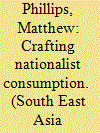

|
|
|
|
|
| Publication |
2013.
|
| Summary/Abstract |
Following the revolution of 1932 that ended absolute monarchy in Siam, a new government came into power that sought to legitimize its rule by encouraging mass identification with the state. Practically, the expansion of a wage economy and the development of a state-led education system were seen by government officials as central to promoting a sense of citizenship to as yet disinterested rural communities. Throughout its first decade in power, the government thus set up projects to provide such groups with skills that might contribute to their overall material advancement. Following the lead of similar endeavours, particularly in India, one of the principal ways in which it would do this was through the production and bringing to market of cotton textiles. However, with foreign imports both superior in quality and cheaper than anything produced internally, the state struggled to establish a public relations message that might convince consumers to purchase Thai-produced textiles. As a result of specific limitations rooted in Thailand's ambiguous status globally, this meant that Thai leaders struggled to replicate the success of such movements elsewhere
|
|
|
|
|
|
|
|
|
|
|
|
|
|
|
|
| 4 |
ID:
124880
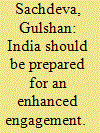

|
|
|
|
|
| Publication |
2013.
|
| Summary/Abstract |
Irrespective of what happens between Afghanistan and the US on bilateral security agreement as well as on the Afghan peace process, it is clear that a new phase in the Afghanistan project is going to begin from 2015. Within this context, most analysts and international reports indicate that, in the post-2014 phase, the country is going to face major challenges in three major areas: security, political and economic. Enhanced Indian engagement in Afghanistan could help the country meet the difficult challenges in all these areas during its decade of transformation (2015?2024).
|
|
|
|
|
|
|
|
|
|
|
|
|
|
|
|
| 5 |
ID:
128311
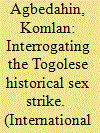

|
|
|
|
|
| Publication |
2014.
|
| Summary/Abstract |
This article, is about an attempt by women in Togo to use a sex strike to end the country's political impasse. The concept dates back to the ancient Greek comedy Lysistrata by Aristophanes, first presented publicly in 411 b.c. More recently, a sex strike had been used with some success in Liberia that inspired Togolese women to attempt this method of non-violent action. The Togolese experiment, however, ended in failure. This article discusses reasons for the failure, including inadequate preparation and miscommunication and the neglect of the political, economic, and social context of Togo.
|
|
|
|
|
|
|
|
|
|
|
|
|
|
|
|
| 6 |
ID:
133108


|
|
|
|
|
| Publication |
2014.
|
| Summary/Abstract |
This special issue of Geopolitics focuses on recent shifts in the geopolitics of agro-food systems linked to debates around a new 'Global Food Crisis' and its implications for (trans)national political agendas. Spurred since 2006 by rising food prices, large-scale farmland acquisitions, and growing public protests, these concerns have motivated new streams of development assistance and reforms to global governance processes, as well as strengthened activism by agrarian social movements. While governments and civil society organisations have struggled with how best to address the realities of worsening food insecurity, the discourse of crisis has simultaneously helped to actively reposition food security as an object of urgent geopolitical calculation and strategy. The stubborn grip of continuing poverty and hunger has prompted many observers to envision a future in which chronic food insecurity and associated political and economic disorder are the new normal.
|
|
|
|
|
|
|
|
|
|
|
|
|
|
|
|
| 7 |
ID:
132007


|
|
|
|
|
| Publication |
2014.
|
| Summary/Abstract |
William Eleroy Curtis was central to the creation of the Pan-American movement in the United States. As a lobbyist and bureaucrat, he helped organize the first Inter-American Conference in 1889-1890. As a journalist he became a leading "expert" on Latin America. This article uses Curtis to explore the relationship between Pan-Americanism and empire. Before 1898, Curtis sought only expanded trade, not territory for the United States. However, to explain why the country would "naturally" come to dominate Latin American markets, he depicted Latin Americans as backward yet capable of uplift through the infusion of U.S. knowledge and capital. He thus justified hemispheric control and helped U.S. Americans envision empire as a tutelary imperative. When Curtis supported territorial expansion in 1898 he did so in the language of civilizing mission rather than market aggrandizement. In combining narratives of difference and equality, Pan-Americanism served Curtis as a transitional imperial ideology.
|
|
|
|
|
|
|
|
|
|
|
|
|
|
|
|
| 8 |
ID:
132213
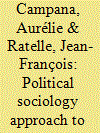

|
|
|
|
|
| Publication |
2014.
|
| Summary/Abstract |
This article seeks to foster a better understanding of the diffusion of conflict in the North Caucasus. We argue that diffusion of conflict is a dynamic and adaptive process in which outcomes are shaped by the intersection of three social mechanisms-attribution of similarity, brokerage, and outbidding-and the political, social, and religious contexts. We suggest that a distinction should be made between horizontal and vertical processes of diffusion. We also approach the empirical diffusion of conflict from a different perspective, showing that non-Chechen actors have played a key role in both the diffusion process and its outcomes.
|
|
|
|
|
|
|
|
|
|
|
|
|
|
|
|
| 9 |
ID:
126647


|
|
|
|
|
| Publication |
2013.
|
| Summary/Abstract |
The recruitment of the all-female Rani of Jhansi Regiment of the Indian National Army in Japanese-controlled Singapore and Malaya, with a particular focus on the period between the first female guard of honour on 12 July 1943 through to the opening of the regiment's main camp in Singapore on 22 October 1943, has to date been insufficiently studied. Starting with the conception of the Regiment in an Axis submarine by the Indian nationalist leader Subhas Chandra Bose (1897-1945), this paper examines the ideas and figures that inspired the regiment and the role of Bose and Dr Lakshmi Swaminadhan (1914-2012) in mobilizing recruits. A division of labour can be distinguished, whereby Bose's rallies and speeches awakened a desire and commitment to join the regiment, whereas Dr Lakshmi used a door-to-door approach and access to homes to convince parents and to confirm participation. By 22 October 1943, 156 women and girls from among the Indian communities in Singapore and Malaya from a wide range of ethnic, social, religious and language backgrounds had joined the regiment that was part of Bose's plan to liberate India from British domination. Among the key sources used in this paper are Dr Lakshmi's late-1960s autobiography and the 2007 autobiographical account of one of her then 16-year-old recruits, Rasammah Naomi Navarednam (b 1927).
|
|
|
|
|
|
|
|
|
|
|
|
|
|
|
|
| 10 |
ID:
132713
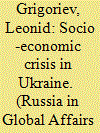

|
|
|
|
|
| Publication |
2014.
|
| Summary/Abstract |
Ukraine's main chance of entering Europe not as a source of labor force, but as a moderately developed industrialized country will be to go ahead with exports to Russia and other countries where Ukrainian manufactures are in demand.
Ukraine's socio-political and economic crisis did not emerge out of nowhere and it will not die down all by itself. It has lasted throughout the period of post-Soviet transformation, and there are no immediate reasons to hope it will end soon. Our observations made from the very outset of this process1 provide ample reasons to postulate that the original expectations of progress have failed to materialize. In 2007 we maintained that Ukraine had very good chances of taking a worthy place in Europe by virtue of the potential competitive edges of the Ukrainian economy, but that would require hard work, patience, time and a coherent policy. Over the past five to ten years, in particular, in the context of the current political crisis, that chance has been wasted and, regrettably, another one may offer itself only in the distant future
|
|
|
|
|
|
|
|
|
|
|
|
|
|
|
|
| 11 |
ID:
129055
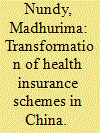

|
|
|
|
|
| Publication |
2014.
|
| Summary/Abstract |
Health insurance has been one of the major forms of health financing in China since the 1950s. Health insurance in China has seen dramatic shifts given the different economic and political contexts. From an almost universal coverage and access to health services in the pre-reforms period, China witnessed tremendous inequities in access with the breakdown of its collective financing structures and rising costs of health care in the 1980s and 1990s in both rural and urban areas with the onset of economic reforms. As a result policies in the late 1990s and 2000s shifted towards universalising access by introducing different insurance schemes for the urban and rural population. This article attempts to trace this transformation in insurance schemes through three distinct phases and draws lessons for access to health services.
|
|
|
|
|
|
|
|
|
|
|
|
|
|
|
|
| 12 |
ID:
128277
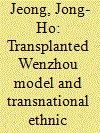

|
|
|
|
|
| Publication |
2014.
|
| Summary/Abstract |
This paper explores why Zhejiangcun's Wenzhou migrants and Wangjing's Chaoxianzu migrants were able to maintain and actively restructure their settlements in Beijing while Beijing's other migrant settlements either disappeared or were forced out from their original locations. Highlighting the role of the Wenzhou model in Zhejiangcun and that of the transnational ethnic ties in Wangjing, this research illustrates how certain rural migrants emerged as a new social group by utilizing their cultural capital based on native-place and ethnic ties and newly found economic power. The present study examines the urban space of Zhejiangcun and Wangjing where alternative sources of economic power and social networks were created and utilized and therefore offers a unique perspective by locating a specifically-founded ethnographic analysis within the general debate on the restructuring of post-reform urban space.
|
|
|
|
|
|
|
|
|
|
|
|
|
|
|
|
| 13 |
ID:
130514
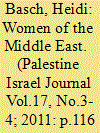

|
|
|
|
|
| Publication |
2011.
|
| Summary/Abstract |
The 100"' Anniversary of lnternational Women's Day on March 8"' was marked around the Middle East by only a small number of events, according to the International Women's Day (IWD) 20]! website. in stark contrast to other parts of globe. Nonetheless, the consistent and visible participation of women in the popular protests which have swept the region during 201 l puts paid to the long-held image ol' Middle Eastern women as passive and powerless beings. What this means regarding the struggle to improve the status of women in the region remains to be seen. As in the rest of the world, the struggle for women's rights in the Middle East is ongoing. Arguably, though, the region poses especially formidable challenges. Nowhere else are the gains already achieved so precarious, or as reliant upon a particular regime and its ability to steer power away from forces opposed to expanding women's rights. The 1979 Iranian Revolution provides prime evidence to that effect: In its aftermath, women ofall social classes, religious backgrounds and political ideologies were Forced to conform to restrictive socio~political and economic roles dictated by Ayatollah Khomeini and his supporters.
|
|
|
|
|
|
|
|
|
|
|
|
|
|
|
|
|
|
|
|
|